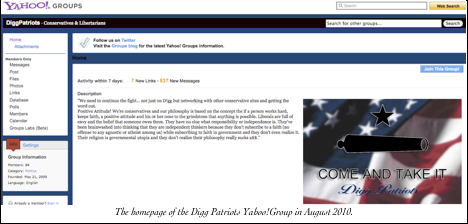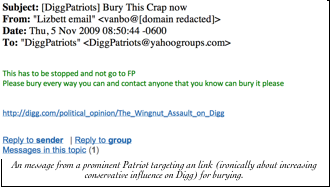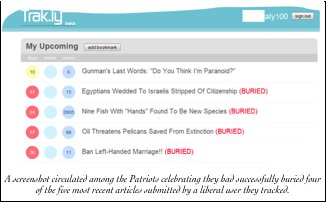“Bury Until They Change Their Ways”: The Digg Patriots As User-Generated Censorship
Wednesday, April 6, 2016
Chris Peterson (MIT)
Introduction to the Digg Patriots and User-Generated Censorship
In May 2009, an ad hoc coalition of politically-conservative members of the social news site Digg collectively founded a Yahoo!Group community and mailing list,called the Digg Patriots. The Patriots were united by a shared self-identification with movement conservatism, a belief that liberal users of Digg were profoundly wrongheaded, and a desire to terraform the political landscape of Digg to be more consonant with their conservatism to project.

SUBJ: Re: DiggPatriots- Whining again
> > I’ll continue to bury their submissions until they change their ways and become conservatives. =^)
> > - VRayZ, June 6 2010
As a graduate student at MIT, Chris studied the Digg Patriots as a case of what he calls user-generated censorship: a mode of political activism through which actors manipulate the affordances of social media to suppress speech. In this case study, Chris argues that the same tools and systems designed to facilitate ‘speech’(Peterson 2007, 9–10) can and have been repurposed to suppress it, through ‘flagging’ campaigns on Facebook (York 2011), downvote bots on reddit (Peterson 2013), NegativeSEO on Google Search (Peterson 2013), and other similar approaches.Because their mailing lists were leaked in August 2010 (Peterson), the Digg Patriots present an unusually well-documented case of user-generated censorship. He reviewed nearly 13,000 emails exchanged between the Patriots over the course of 11 months as they coordinated their campaign to make Digg more conservative.
“Any Chair In A Bar Fight”: Strategy & Tactics of the Digg Patriots
Digg was one of the most popular websites in the world during the Patriots’ campaign to make it more conservative (Lacy and Hempel 2006).
> > A ‘social news’ site, Digg allowed users to submit links to external content such as news stories or videos.
Other users would then vote to ‘digg’ or ‘bury’ the links, which, along with other factors including recency and comment activity, would algorithmically cause those links to rise or fall in an ordinal ranking and becoming more or less visible to Digg’s ~30 million monthly visitors. The Digg Patriots developed a set of crude-but-effective-and-a-even-a-bit-ingenious techniques which let them leverage these algorithmic inputs to alter the political composition of Digg.

Coordinated Digging and Burying
The Patriots’ primary method was to coordinate votes through the Yahoo!Group. When a Patriot identified a newly submitted link as liberal they would quickly forward the link to the entire group with a synopsis and an urgent call for burying. The Patriots also coordinated ‘up’ votes for conservative links as well, particularly posts made by fellow Patriots. Although almost 7,000 targeted links are included in the corpus, this drastically under-represents the total activity of the Patriots: from April 2009 to August 2010 a single Patriot dugg an astounding 76,000 links and submitted over 1,600 articles, 20% of which made the front page with assistance from her allies (Lizbett 2013).

Strategic Comment Activity
SUBJ: Re — BurY Mutual?
> > Please, Please,stop the discussions. You are playing right into their hands.If you just can’t help yourself, then Maybe you should find another outlet for your frustration. I spend far too much time on Digg to see it wasted by immature sniping. I hope no one is offended, but remember why we are here. We want to Depress the progressive stories, while encouraging conservative ones.
> > - rgcmsg G, March 29 20105
Digg allowed users to comment on links, and incorporated comment activity as an index of interest such that, ceteris paribus, links with more comments would rise, and links with fewer would fall. The Patriots harnessed this dynamic to their advantage, discouraging members from commenting on liberal posts (“Venting here, so I don’t violate DP discipline and comment on a submission we’re trying to bury”) and purposefully trolling the comments of conservative posts to bait liberals into responding (“We probably should concentrate on…creating conversational comments to pull in more people to comment when they come by to digg on our stories”). By doing so, the Patriots inverted the conception of the comment section, flipping their function from a sphere of deliberative discourse to an instrument of its suppression.
Cultivating Alliances to Extend Influence
SUBJ: RE: FP for J!
> > Okay folks, want to hit FP often? Follow J’s lead. He’s got 90+ friends all who digg early (this is key). If you can cultivate 90–100 friends like this your subs will hit on a regular basis, but cultivating this many GOOD friends requires you to do the same for them. Gotta digg ’em early and never miss.
> > -phil d., June 17 2010
The Patriots expanded their ranks by recruiting small armies of “mutuals”: unaffiliated users at the other end of a symmetrical relationship which allowed two Digg users to see what the other had submitted. A Patriots would identify highly-active Diggers request mutual status The Patriot would then groom the mutuals, monitoring how rapidly and regularly they (the mutual) would upvote t Patriot submissions, retaining those who reliably did so quickly and dropping those who did not. The Patriots, who were in other respects ultrapartisans, adopted a highly pragmatic approach when it came to grooming their mutuals (“I don’t befriend based on someone’s politics. I look at their stats”). The most highly prized mutuals were also (and because of) the most dehumanized: those which could be treated as black boxes, mechanical reproducers of input -> output almost an extension of the Digg algorithm itself.
“A Rude Wake-Up Call”: Reading the Digg Patriots
SUBJ: Re: Digg Patriots
> > In short, the Digg Patriots was a response to a wave of leftism that had grown smug and arrogant in its presence on Digg. We were a rude wake-up call that there were those who felt otherwise within Digg.
> > - R.J. Carter, February 12 2013
On August 5, 2010, a muckraking blogger and progressive activist writing under the name of OleOleOlson revealed the existence of the Patriots in a blog post for Alternet (OleOleOlson 2010).
Since Olson’s expose, the Patriots have been considered mostly unsympathetically by the few popular press articles which have referenced them. When you read the emails, especially those excerpts Olson chose to hightlight, it’s easy to see why: many are rife with the worst sexist, racist, and homophobic slurs characteristic of the rotten base of contemporary movement conservatism.
Yet the character of their cause is, from the perspective of digital civics, more complex:
SUBJ: Re: Bury Now Novahater’s sub
> > Again the question arises about the validity of us organizing through email…
> > I feel we are far outnumbered. So does that make what we do right?
> > To fight for what is right and just, I would say yes. Hopefully more people will see our beliefs as the right way. We’re called the right for a reason.
> > - R.J.C., October 29 200911
The Patriots understood that the authorized logic of Digg, which both designed for and demanded ‘independent’, uncoordinated voters, was a crudely majoritarian model, and thus not ‘neutral’ in its effect but in fact reproductive of the majority’s politics. Since (they believed) liberals outnumbered conservatives on Digg, without coordination the conservative viewpoint would lose, and so they needed to support each other to give their perspective a fighting chance. Both Olson and I have characterized the Patriots as censors, but from a different perspective they could be read as a determined minority mobilizing a fully sympathetic Get Out The Vote effort to “wake-up” other users and have their voices heard.
The story of the Digg Patriots, like any text, can be and in fact is read differently by different readers: how you feel about their mission and methods says rather less about the Patriots themselves than about how you believe digital civics should properly be practiced. The hotly contested case of the Patriots, along with many analogues across civic media, remind us that we have still not yet settled on a stable consensus on how these new sociotechnical systems ought to work, and ought to be worked, as critical levers of power in our emerging networked political apparatus.
References
Lacy, Sarah, and Jessi Hempel. “Valley Boys.” BusinessWeek: Magazine, August 13, 2006.
http://www.businessweek.com/stories/2006-08-13/valley-boys/.
OleOleOlso. 2010 “Massive Censorship of Digg Uncovered.” Alternet, August 5. http://blogs.alternet.org/oleoleolson/2010/08/05/massive-censorship-of-digg-uncovered/.
Peterson, Chris. 2007. “User-Generated Censorship: Manipulating the Maps of Social Media” (master’s thesis, Massachusetts Institute of Technology), esp. at 9–10, http://dspace.mit.edu/handle/1721.1/81132.
Peterson, Chris. 2013. “The Fault, Dear Reddit, Is Not In Our Bots, But In Ourselves: The Case of LibertyBot.” MIT Center for Civic Media, March 22. http://civic.mit.edu/blog/petey/the-fault-is-not-in-our-bots-dear-reddit-but-in-ourselves-the-case-of-libertybot.
Peterson, Chris. 2013. “Google NegativeSEO: Case Study in User-Generated Censorship.” MIT Center for Civic Media, March 20. http://civic.mit.edu/blog/petey/google-negativeseo-case-study-in-user-generated-censorship/.
If you like what you just read, please click the green ‘Recommend’ button below to spread the word! More case studies and calls for submissions are on the Civic Media Project. To learn more about civic media, check out the book Civic Media: Technology, Design, Practice.